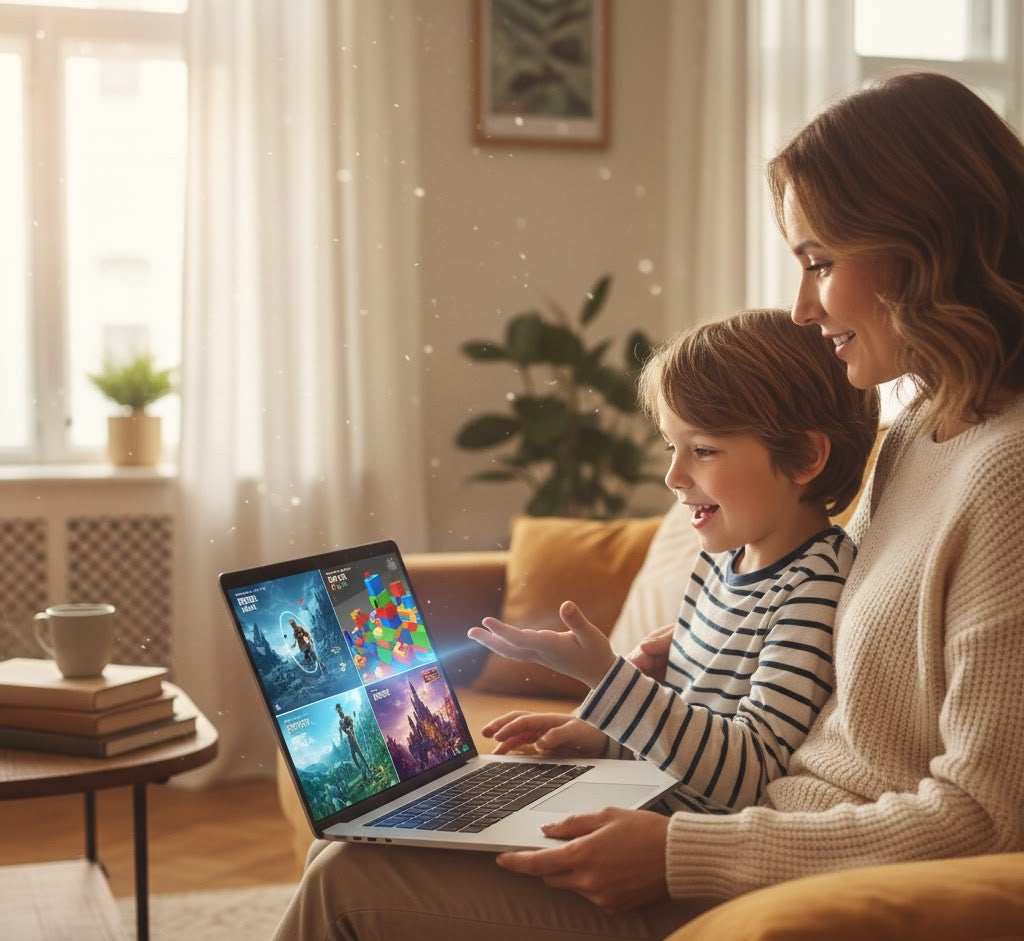Do you ever feel like you're losing your child to the screen?
If you have a young gamer at home, you know how hard it can be to pull them away from the game. But gaming isn’t all bad- when balanced right, it can be a fun, social, and even educational activity! And you might find that gaming is a great way to connect with your child.
By understanding their gaming world, we create a solid foundation for open conversations.
These tips will help you create a healthy and positive gaming experience for both you and your child. It’s all about finding the right balance - one that embraces the benefits while managing the challenges.

Nothing melts a young gamer's heart more than when their parents take an interest in the hobby they love.
1. Be curious together
Nothing melts a young gamer's heart more than when their parents take an interest in the hobby they love. Whether it's joining them for their favorite game, asking questions to understand what it's about, or exploring tutorials together on YouTube, these small actions build trust and connection.
Another benefit is that we actually know what our child is playing. This way, we are able to know if the game is age-appropriate, if it’s loaded with commercials, if there is interaction with other players, and so on.
2. Agree on boundaries
When kids feel heard and understood, discussions about rules become much more clear to them, and they get more open to accepting our perspectives as well.
When we make an effort to understand the different aspects of our child's hobby, it becomes easier to set boundaries for screen time that make sense to them. Involving them in creating healthy boundaries will help establish rules that are understandable and realistic for the whole family.
Virtual friendships, conversations, and teamwork within games hold real value for kids. The social aspect of gaming is a huge part of what makes it enjoyable.
3. Show interest in the community
For many kids, a big part of gaming - once they’re old enough - is playing with friends and connecting with others in the online community. As parents, we often overlook or underestimate the significance of these interactions.
Virtual friendships, conversations, and teamwork within games hold real value for kids. The social aspect of gaming is a huge part of what makes it enjoyable. That’s why being abruptly cut off mid-conversation due to screen time limits or having to leave a game on a bad note with another player can be frustrating. Try to picture it like a football match: leaving your team 10 minutes before the match is over would upset most of us.
4. Be mindful of in-game purchases
Many games are designed to keep players engaged - and spend money. In-game purchases and premium content can be tempting, so it’s important to discuss spending habits with your child.
Make sure your credit card details aren’t stored on their gaming accounts. Kids don’t always understand that virtual items or currency costs real money and will click ‘buy’ if they are able to.

5. Encourage breaks
Gaming is fun and engaging, and many young gamers find it hard to take breaks. But no hobby should take up all of a child’s free time and affect other important activities, such as sleep, exercise, or time with family and friends.
As parents, we can help them create a balanced structure around gaming, agree on specific days or hours for play, and support them in maintaining healthy habits.
6. Monitor the tone in games
If our child communicates with friends or other players online, we should be aware of any bullying, harsh language, or conflicts that may arise during gameplay. Harsh comments from a stranger can make a big impact on a child.
Take it seriously if your child experiences negative interactions or issues within their friend group in a game, and discuss ways they can handle them.
If your child is a girl, be extra mindful. Girls often face unwanted attention and harassment in the gaming world. Likewise, teach your boys to respect and support girls in gaming.
Let’s make sure that games and screens won't be the only place for our children to seek company and companionship.
7. Talk about online safety
Discuss the importance of protecting personal information and being cautious about who they interact with online. Unfortunately, there are strangers with bad intentions who use gaming as a way to reach their victims.
When kids are involved in online trading, we have to be extra careful and remind them to watch out for scams. Scams are unfortunately very common and can be hard to avoid, so here is what to do if it happens to your child.
8. Spend time with your child
Many kids will start gaming when they are bored or feel lonely. When kids are young especially, it's easy to lean on video games to keep them occupied—whether to get things done or just have a moment to breathe. But relying on screens too often at a young age can set the stage for habits that are harder to break later.
We can often succeed in getting our kids away from the screen just by being available for fun activities together. Relationships need to be nurtured, and it’s our responsibility as parents to set the scene for these relationships to blossom.
...
Let’s make sure that games and screens won't be the only place for our children to seek company and companionship.





